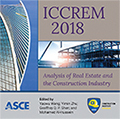International Conference on Construction and Real Estate Management 2018
Does Land Finance Matter the Tertiarization of Industry Structure? A Perspective Based on Urban Scale
Publication: ICCREM 2018: Analysis of Real Estate and the Construction Industry
ABSTRACT
The phenomenon of land financing is unique to China. This paper tries to investigate whether the effects of land finance on the tertiarization of a city’s industry structure vary with urban scale and explore the underlying mechanisms both theoretically and empirically. The paper hypothesizes that only when a city’s economic development reaches a certain size will local governments be more inclined to develop the tertiary industry, which could generate greater revenue from residential and commercial land. As a result, land finance may accelerate the tertiarization of a city’s industry structure. Using panel data from 282 cities, prefecture-level and above, in China from 2004 to 2013, the empirical results are as follows. First, it is found that land finance has no significant effect on tertiarization of industry structure for the country as a whole. However, when cities were grouped by size, there were heterogeneous effects. Specifically, land finance had a positive effect on tertiarization of industrial structure in medium-sized cities, but did not have a significant effect for large or small cities.
Get full access to this article
View all available purchase options and get full access to this chapter.
ACKNOWLEDGEMENT
This research is Supported by the National Natural Science Foundation of China (Grant No. 71373295), (Grant No. 71473283) and Open Project Fund of Institute for China Sustainable Urbanization, Tsinghua University (Grant No. TUCSU—K—17013—01).
REFERENCE
Chen, J. and Zhou, Q. (2016). “The synergy effects of city size and industrial structure on urban labor productivity in China.” Journal of Finance and Economics, 42(9), 75-86. (in Chinese).
Guo, L. and Wang, Y.X. (2015). “The impact of land finance on the upgrading of China’s industrial structure: from the perspective of tax differences among industries and land finance.” Jiangxi Social Sciences, 35(8), 33-40. (in Chinese).
Kuznets, S. (1971). “Economic Growth of Nations: Total Output and Production Structure.” Bwlknap Press, England.
Li, Y.G. and Wang, M. (2015). “Land finance and industrial structure Tertiarization: a new perspective of an explanation of ‘Chinese Paradox’ of industrial structure Tertiarization.” Journal of Finance and Economics, 28(2), 54-63. (in Chinese).
Pan, J.N., Huang J.T. and Chiang T.F. (2015). “Empirical study of the local government deficit, land finance and real estate markets in China.” China Economic Review, (32), 57-67.
Tao, C.Q. and Liu, Z. (2017). “Does land finance contribute to the rationalization of industrial structure? empirical evidence from Chinese provincial panel data.” Fiance and Trade Research, 28(2), 54-63. (in Chinese).
Wu, C.Q. and Song, X. (2016). “Study on the service level and influence factors of the industrial structure in Metropoli—Take Beijing, Shanghai and Guangzhou as an example.” Regional Economic Review,(3), 69-76. (in Chinese).
Wu, Q., Li, Y. and Yan, S. (2015). “The incentives of China’s urban land finance.” Land Use Policy, (42), 432-442.
Xia, F.Z., Li, Y.Y. and Yan, J.M. (2014). “The relationship between land finance and economic growth under the industrial structure perspective—based on dynamic panel data analysis with SYS-GMM methods.” Economic Geography, 34(12), 85-92. (in Chinese)
Zhang, J., Zhang, Y.Y. and Mo, Y. (2013). “On the effect of foreign trade on the evolution of industrial structure towards Tertiarization in China: From the perspective of international manufacturing-service division of labor.” Journal of Finance and Economics, 39(6), 16-27. (in Chinese).
Zhao, X. and Tan, R. (2016). “Land finance and "De-industrialization" of cities in China.” Jianghan Forum, (1), 16-24. (in Chinese).
Zheng, H., Wang, X. and Cao, S. (2014). “The land finance model jeopardizes China’s sustainable development.” Habitat International, (44), 130-136.
Zheng, K.Q., Peng, D.Y., Hu, Ch.L. and Lu, Y.H. (2008). “Prediction of inflection point of Jiangxi industrial structure service and its policy implications.” Jiangxi Social Sciences, (08), 37-43. (in Chinese).
Information & Authors
Information
Published In
ICCREM 2018: Analysis of Real Estate and the Construction Industry
Pages: 108 - 115
Editors: Yaowu Wang, Professor, Harbin Institute of Technology, Yimin Zhu, Professor, Louisiana State University, Geoffrey Q. P. Shen, Professor, Hong Kong Polytechnic University, and Mohamed Al-Hussein, Professor, University of Alberta
ISBN (Online): 978-0-7844-8174-5
Copyright
© 2018 American Society of Civil Engineers.
History
Published online: Aug 8, 2018
Authors
Metrics & Citations
Metrics
Citations
Download citation
If you have the appropriate software installed, you can download article citation data to the citation manager of your choice. Simply select your manager software from the list below and click Download.
